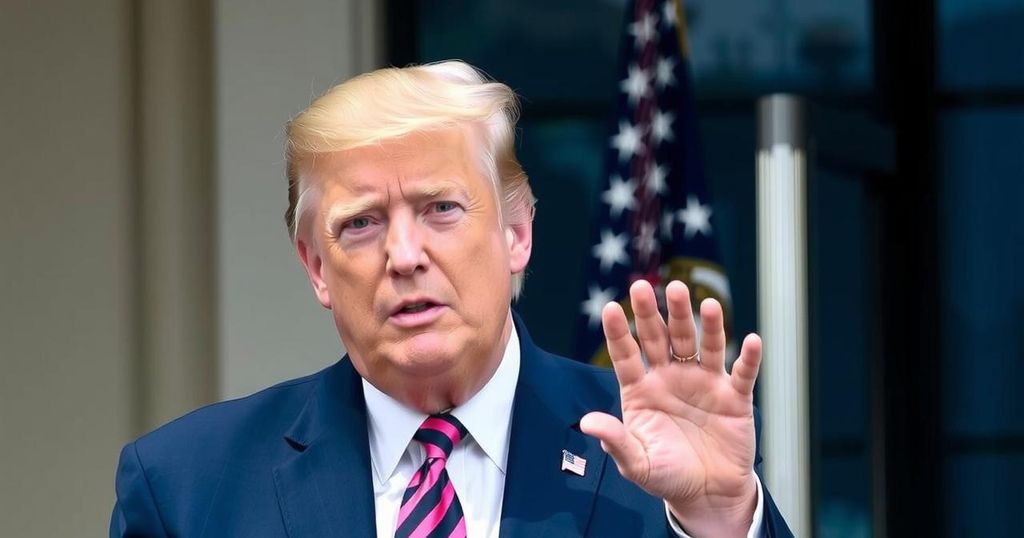Trump’s Energy Plan: A Strategy to Prevent America’s Energy Crisis
President-elect Donald Trump will declare a national energy emergency to undo Biden’s energy restrictions and promote economic independence. His plan includes ending electric vehicle mandates, promoting natural gas exports, and addressing rising energy costs hurting Americans. The proposal aims to avoid Europe’s energy crisis and restore manufacturing jobs impacted by climate regulations.
President-elect Donald Trump has unveiled a bold energy plan aiming to declare a national energy emergency upon taking office. His proposal includes terminating the current administration’s restrictions on energy production, abolishing electric vehicle mandates, and rescinding the limitations on natural gas exports. With America navigating a precarious energy landscape exacerbated by the Biden administration’s policies, Trump’s intentions may steer the country away from the pitfalls experienced by Europe due to stringent climate regulations that have adversely impacted employment and industrial output.
The ramifications of climate policies are evident in Europe, particularly within the manufacturing sector. Countries like Germany have witnessed a significant decline in industrial performance, anticipating a continued 3% downturn in production for 2024. These reductions result in job losses, especially in industries such as automotive, where German workers face layoffs driven by the influx of cheaper electric vehicles from China. To counteract such trends, Trump’s proposed revisions to the climate regulations seek to bolster American workers and stabilize energy prices.
Electricity and transportation costs have surged under the existing administration, with residential electricity costs escalating by 32% since January 2021. Such increases disproportionately affect vulnerable populations and small business owners, ultimately contributing to broader inflationary challenges. By altering or dismantling federally mandated climate initiatives, Trump aims to remedy the issues befalling American consumers while simultaneously promoting economic independence from foreign powers like China.
The current regulatory landscape also imposes significant burdens on automobile manufacturers, mandating a dramatic increase in the production of electric vehicles by 2032. This regulation, juxtaposed with state-specific rules such as California’s Advanced Clean Car II, further complicates compliance and drives up vehicle prices for consumers. Trump’s plan includes repealing such mandates to minimize the financial impact on Americans, allowing them to purchase more affordable gasoline-powered vehicles instead.
The complexities of integrating renewable energy sources have led to increased production costs, with states enforcing renewable mandates experiencing significantly higher electricity prices. In contrast, states without such requirements tend to enjoy lower costs. It is proposed that dismantling incentives for renewables, while bolstering natural gas, coal, and nuclear energy production, will result in lower utility bills for American households.
Trump’s declaration of a national energy emergency signifies a recognition of the urgent need to reverse the detrimental policies of the Biden administration, intended to mitigate climate change but resulting in escalating living costs for the populace. A strategic pivot towards energy independence and reduced reliance on foreign energy sources may provide a more sustainable and economically viable future for the nation.
The topic revolves around President-elect Donald Trump’s energy plan and its contrast to the Biden administration’s approach to energy production and climate policies. The discussion addresses the implications of stringent climate regulations in Europe and the resulting economic hardships, particularly highlighting job losses and industrial decline. Furthermore, it scrutinizes the impact of current energy policies on American consumers, focusing on rising costs and inflation. Trump’s plan seeks to promote energy independence and economic stability by reversing regulations deemed detrimental to the American workforce and economy.
In conclusion, President-elect Trump’s energy plan aims to address the urgent national energy emergency exacerbated by current administration policies. By rolling back restrictive regulations, promoting traditional energy sources, and ensuring affordability for consumers, the plan envisions a path toward economic stability and independence. With the historical lessons from Europe’s experiences in mind, this strategy seeks to revitalize American industry and prevent further economic decline linked to ill-conceived climate policies.
Original Source: www.heritage.org




Post Comment